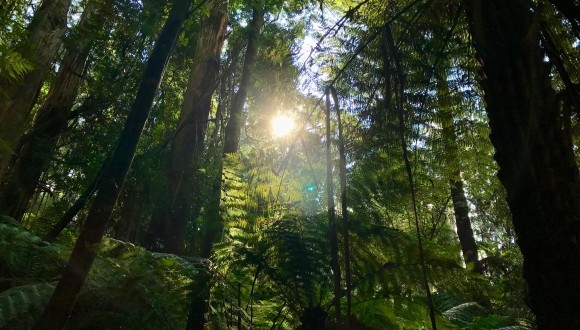Tropical forests are the terrestrial plant ecosystems to which climate change poses the greatest risk
A study involving CREAF's Josep Peñuelas has identified the optimal temperatures of terrestrial plant ecosystems throughout the world and indicates the size of their margin for adaptation to warming. Outside that margin, ecosystem growth slows sharply.

An international study co-directed by the CREAF-based CSIC researcher Josep Peñuelas has calculated the optimal temperatures of terrestrial ecosystems across the planet and how they might react to climate change.
According to the study, terrestrial ecosystems' average optimal temperature ranges from 20°C to 32°C (26°C ± 6°C), with warmer regions having higher values than colder regions. An ecosystem's ability to grow and to capture carbon dioxide (CO2) declines sharply if the air temperature exceeds its optimal temperature.
An ecosystem's ability to grow and to capture CO2 declines sharply if the air temperature exceeds its optimal temperature.
The data in question is highly relevant because terrestrial ecosystems are carbon sinks and their capacity for sequestering emissions is a key factor in climate change projections. Until now, however, predictions of how such ecosystems might acclimatize have not taken their optimal temperatures into account.
Published in Nature Ecology & Evolution and authored by 25 specialists from 19 research centres and universities, the study was led by Peñuelas, Shilong Piao (Peking University), Philippe Ciais (LSCE-CNRS, Paris) and Ivan Janssens (University of Antwerp). Its findings provide insight into how different plant ecosystems (woodlands, forests, savannahs, agricultural land, tundra, etc.) around the world will react to global warming.
Optimal temperature as a limit
An ecosystem's optimal temperature actually constitutes a limit, indicating the extent of its margin for adapting to warming. If the average air temperature rises beyond the optimum, the ecosystem's capacity for growth and CO2 retention diminishes significantly due to water stress, accelerated leaf ageing and increased leaf thickness, among other causes
The study's results show that tropical forests are more vulnerable than other ecosystems, as their optimal temperature, 29°C with a margin of 3°C either way (29°C ± 3°C), is very close to their average air temperature. This is worrying, as Peñuelas explains, because “tropical forests make up much of our planet's vegetation cover and are essential in terms of emission capture”.
The ecosystems with the greatest margin for adaptation include Tibetan tundra, with an optimal temperature of 13°C ± 3°C, and boreal evergreen forests, with an optimum of approximately 18°C.
This is worrying, Josep Peñuelas explains, because “tropical forests make up much of our planet's vegetation cover and are essential in terms of emission capture”.
“Boreal forests are the forests that have grown the most in recent years, and their growth is making it possible to trap more CO2”, says Peñuelas. “However, their growth is constantly slowing, and restrictions such as limited space and water availability mean it won't continue indefinitely”, he adds.
The meticulous study involved compiling and analysing a wide range of information, including data on productivity and photosynthesis capacity, daily average temperatures, satellite observations of vegetation and its geographical distribution, and data from roughly 500 flux towers (which analyse air flows, exchanges of CO2, and the proportion of emissions absorbed by plants) around the world.
The global daily maximum air temperature is expected to have increased by 1.9°C by the end of the century, according to the most conservative estimates. The most pessimistic forecasts anticipate an increase of 5.6°C.
Article:
'Air temperature optima of vegetation productivity across global biomes', Nature Ecology & Evolution's, Mengtian Huang, Shilong Piao, Philippe Ciais, Josep Peñuelas, Xuhui Wang, Trevor F. Keenan, Shushi Peng, Joseph A. Berry, Kai Wang, Jiafu Mao, Ramdane Alkama, Alessandro Cescatti, Matthias Cuntz, Hannes De Deurwaerder, Mengdi Gao, Yue He, Yongwen Liu, Yiqi Luo, Ranga B. Myneni, Shuli Niu, Xiaoying Shi, Wenping Yuan, Hans Verbeeck, Tao Wang, Jin Wu and Ivan A. Janssens.






